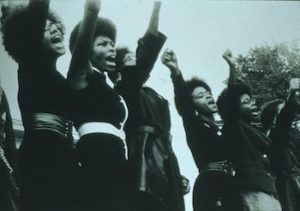
*The Combahee River Collective (CRC) is celebrated on this date in 1974. The CRC was a Black feminist lesbian organization active in Boston from 1974 to 1980.
Their name commemorated an episode at the Combahee River organized and led by Harriet Tubman on June 2, 1863, in the Port Royal region of South Carolina. The action freed more than 750 slaves and is the only military campaign in American history planned and led by a woman. The Collective was instrumental in highlighting that the white feminist movement was not addressing their particular needs. They developed the Combahee River Collective Statement, a key document in the history of contemporary Black feminism and the development of the concepts of identity as used among political organizers and social theorists. It was founded by author Barbara Smith and other delegates. In their first regional meeting in 1973, the National Black Feminist Organization in New York City provided the groundwork for the Combahee River Collective with their efforts to build a NBFO Chapter in Boston.
In her 2001 essay "From the Kennedy Commission to the Combahee Collective", historian and African American Studies professor Dr. Duchess Harris states that, in 1974 the Boston collective "observed that their vision for social change was more radical than the NBFO", and as a result, the group chose to strike out on their own as the Combahee River Collective. Members of the CRC, notably Barbara Smith and Demita Frazier, felt it was critical that the organization address the needs of Black lesbians, in addition to organizing on behalf of Black feminists. Smith, who owned a book called, suggested the Collective’s name: Harriet Tubman, Conductor on the Underground Railroad by Earl Conrad. She "wanted to name the collective after a historical event that was meaningful to African American women." Smith noted: "It was a way of talking about ourselves being on a continuum of Black struggle, of Black women's struggle."
The Combahee River Collective Statement was developed by a "collective of Black feminists...involved in the process of defining and clarifying our politics, while...doing political work within our own group and in coalition with other progressive organizations and movements." The CRC statement was structured into four separate chapters:
1. Genesis of Contemporary Black Feminism
2. What We (CRC) Believe
3. Problems in organizing Black feminists
4. Black Feminist Projects and Issues
Members of the collective describe having a feeling of creating something which had not existed previously. Demita Frazier described the CRC's beginnings as "not a mix cake", meaning that the women involved had to create the meaning and purpose of the group "from scratch.” In her 1995 essay "Doing it from Scratch: The Challenge of Black Lesbian Organizing", which borrows its title from Frazier's statement, Barbara Smith describes the early activities of the collective as "consciousness raising and political work on a multitude of issues", along with the building of "friendship networks, community and a rich Black women's culture where none had existed before." Throughout the mid-1970s the Combahee River Collective met weekly at the Cambridge, Massachusetts Women's Center and held retreats throughout the Northeast between to discuss issues of concern to Black feminists. Author Alexis De Veaux, biographer of poet Audre Lorde, described a goal of the retreats as to "institutionalize Black feminism" and develop "an ideological separation from white feminism", as well as to discuss "the limitations of white feminists’' fixation 'on the primacy of gender as an oppression.” Their first "Black feminist retreat" was held July 1977 in South Hadley, Massachusetts. Frazier, Smith, and Smith, who organized the retreats, hoped that they would foster political stimulation and spiritual rejuvenation."
The second retreat was held in November 1977 in Franklin Township, New Jersey, and the third and fourth were scheduled for March and July 1978. "After these retreats occurred, the participants were encouraged to write and publish articles. The importance of publishing was also emphasized in the fifth retreat, held July 1979. Participants at the sixth retreat... discussed articles in the May/June 1979 issue of The Black Scholar collectively titled, The Black Sexism Debate. The seventh retreat was held in Washington, D.C., in Feb. 1980.
The final Statement was based on this collective discussion, and drafted by Barbara and Beverly Smith and Demita Frazier. Smith and the Combahee River Collective have been credited with coining the term identity politics, which they defined as "a politics that grew out of our objective material experiences as Black women." The Collective developed a multidimensional analysis recognizing a "simultaneity of oppressions"; refusing to rank oppressions based on race, class and gender. Author and academic Angela Davis mentioned this analysis drew on earlier Black Marxist and Black Nationalist movements, and was anti-racist and anti-capitalist in nature.